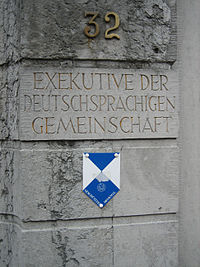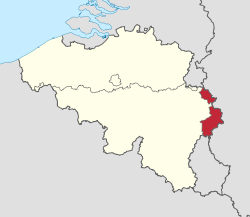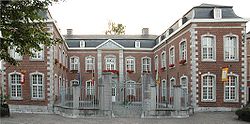- German-speaking Community of Belgium
-
German-speaking Community
Deutschsprachige Gemeinschaft (German)
Communauté germanophone (French)
Duitstalige Gemeenschap (Dutch)— Community of Belgium — 
FlagCountry Belgium Established 1993 Capital Eupen Government – Minister-President Karl-Heinz Lambertz Day of the German-speaking Community November 15 Language German Website www.dglive.be  The Executive (government) of the German-speaking Community meets in Eupen.
The Executive (government) of the German-speaking Community meets in Eupen.
The German-speaking Community of Belgium (German: Deutschsprachige Gemeinschaft Belgiens [ˈdɔɪ̯ʧ.ˌʃpʀax.ɪgə gə.ˈmai̯n.ʃaft ˈbɛl.giəns], DG; French: Communauté germanophone de Belgique; Dutch: Duitstalige Gemeenschap België [ˈdœy̯ts.ˌtaːl.ɪʝə ʝə.ˈmeːn.ˌsxɑp ˈbɛl.ʝi.jə]) is one of the three federal communities of Belgium.[1] Covering an area of 854 km² within the province of Liège (German: Lüttich) in Wallonia, it includes nine of the eleven municipalities of the so-called East Cantons (German: Ost-Kantone). Traditionally speakers of Ripuarian and Moselle Franconian varieties, the local population numbers over 73,000—about 0.73% of the national total. Bordering the Netherlands, Germany and Luxembourg, the area has its own parliament and government at Eupen. Although many of the inhabitants (primarily in the border region next to the Grand Duchy of Luxembourg) in the neighbouring Belgian province of Luxembourg speak Luxembourgish, a West Central German language, they are not considered part of the German-speaking Community. The German-speaking Community of Belgium is composed of the German-speaking parts of the lands that were annexed in 1920 from Germany. In addition, in contemporary Belgium there are also some other German-speaking areas that belonged to Belgium even before 1920, but they are not currently officially considered part of the German-speaking community in Belgium: Bleiberg-Welkenraat-Baelen in Northeastern province of Liège and Arelerland (city of Arlon and some of its nearby villages in Southeastern province of Belgian Luxembourg). However, in these localities, the German language is declining due to the expansion of French.[2]
Contents
History
The area known today as the East Cantons consists of the German-speaking Community and the municipalities of Malmedy and Waimes (German: Weismes), which belong to the French Community of Belgium. The East Cantons were part of the Rhine Province of Prussia in Germany until 1920 (as the counties (Landkreise) of Eupen and Malmedy), but were annexed by Belgium following Germany's defeat in World War I and the subsequent Treaty of Versailles.[3] Thus they also became known as the cantons rédimés, "redeemed cantons". The peace treaty of Versailles demanded the "questioning" of the local population, about their political status. This process was not carried out as an anonymous plebiscite. Instead those locals who were unwilling to become Belgians and who wanted the region to remain a part of Germany were required to register themselves along with their full name and address. In fact the Belgian military administration, headed by Herman Baltia, prevented a fair execution of this "questioning", and many locals feared reprisals or even expulsion after enlisting. Therefore, the plebiscite cannot be considered valid.[citation needed]
In the mid-1920s, there were secret negotiations between Germany and the kingdom of Belgium that seemed to be inclined to sell the region back to Germany as a way to improve Belgium's finances. A price of 200 million gold marks has been mentioned.[3] At this point the French government, fearing for the complete postwar order, intervened at Brussels and the Belgian-German talks were called off.
The new cantons had been part of Belgium for just 20 years when in 1940 they were retaken by Germany in World War II. The majority of people of the east cantons welcomed this as they considered themselves German. Following the defeat of Germany in 1945 the cantons were once again annexed by Belgium, and as a result of alleged collaboration with Nazi Germany an attempt was made to de-Germanize the local population by the Belgian and Walloon authorities.[citation needed]
In the early 1960s Belgium was divided into four linguistic areas, the Dutch speaking Flemish area, the French speaking area, the bilingual capital of Brussels, and the German speaking area of the east cantons. In 1973, three communities and three regions were established and granted internal autonomy. The legislative Parliament of the German-speaking Community, Rat der Deutschsprachigen Gemeinschaft, was set up. Today the German-speaking Community has a fair degree of autonomy, especially in language and cultural matters, but it still remains part of the region of French speaking Wallonia. There has been much argument in the past few years that the German-speaking Community should also become its own region which is an ongoing process with the permanent transfer with previous accord of some competences concerning social policy, conservation of sites and monuments, environment protection policy, transport, the financing of municipalities, among other things from the Walloon Region. One of the proponents of full regional autonomy for the German-speaking Community is the current Minister-President Karl-Heinz Lambertz.[4] Especially regional autonomy for spatial planning, city building and housing should be considered, according to the government of the German-speaking community.[4][5]
Government
The German-speaking Community has its own government, which is appointed for five years by its own parliament.[6] The Government is headed by a Minister-President, who acts as the "prime minister" of the Community, and is assisted by the Ministry of the German-speaking Community. The government currently formed by four Ministers:
- Karl-Heinz Lambertz (SP), Minister-President and Minister for District Authorities.
- Oliver Paasch (ProDG), Minister for Education, Formation and Employment.
- Isabelle Weykmans (PFF), Minister for Culture, Media and Tourism.
- Harald Mollers (ProDG), Minister for Family, Health and Social Affairs
Municipalities in the German-speaking Community
The German-speaking Community consists of the following nine municipalities:[7]
- Amel
- Büllingen
- Burg-Reuland
- Bütgenbach
- Eupen
- Kelmis
- Lontzen
- Raeren
- Sankt Vith
Flag and coat of arms
In 1989, there was a call for proposals for a flag and arms of the Community. In the end the coat of arms of the Community was designed by merging the arms of the Duchy of Limburg and the Duchy of Luxembourg, to which the two parts of the community had historically belonged.
A decree adopted on 1 October 1990 and published on 15 November 1990 prescribed the arms, the flag, the colours as well as the Day of the German-speaking Community of Belgium, which was to be celebrated annually on 15 November.[8]
The coat of arms, in heraldic blazon, is: Arms: Argent, a lion rampant gules between nine cinquefoils azure. Crest: A royal crown. The flag shows a red lion together with nine blue cinquefoils on a white field. The colours of the German-speaking Community are white and red in a horizontal position.
See also
- Parliament of the German-speaking Community and Government of the German-speaking Community
- List of Ministers-President of the German-speaking Community
- German-speaking Europe
- Low Dietsch
References
- ^ The German-speaking Community
- ^ Society for Threatened Peoples: [1]
- ^ a b History of the German-speaking community
- ^ a b De Vries, J.; Tielemans, A. (2008-08-15). "De triangelspeler van België: Duitstalig België" (in Dutch). De Groene Amsterdammer. http://www.groene.nl/2008/33/de-triangelspeler-van-belgie.
- ^ Belga/eb (2009-09-15). "Duitstalige Gemeenschap wil extra bevoegdheden" (in Dutch). De Morgen. http://www.demorgen.be/dm/nl/5036/Wetstraat/article/detail/995456/2009/09/15/Duitstalige-Gemeenschap-wil-extra-bevoegdheden.dhtml.
- ^ German-speaking Community: The jurisdiction of the Government
- ^ German-speaking Community: Cities and commune
- ^ Coat of Arms and Flag of the German-speaking Community
External links
- Deutschsprachige Gemeinschaft, the official site of the German-speaking Community in Belgium.
- Parliament website
- Official site of Karl-Heinz Lambertz, the current premier
Links to related articles  Subdivisions of Belgium
Subdivisions of BelgiumCommunities 
Regions · Provinces Municipalities
by regionArrondissements SaarLorLux Members 
Institutions German people Historical 
Diaspora EuropeTransylvanian Saxons / Landler · Danube / Banat / Satu Mare Swabians · Dobruja · Zipser · Regat · Bessarabia · BukovinaElsewhereCzech Republic (Sudetenland) · Hungary · Bessarabia · Poland · Russia (Volga · Russian Mennonite) · Slovakia · Slovenia (Gottschee County) · Ukraine (Black Sea · Bukovina · Crimea)Balkans and SoutheasternElsewhereArgentina · Bolivia · Brazil · Canada (Hutterites) · Chile · Cuba · Jamaica · Mexico · Paraguay · Peru · United States (Pennsylvania Dutch · Texas · Palatines · Puerto Rico)AfricaNamibia · South Africa (Afrikaners)AsiaOceaniaSee also Flemish · WalloonsBold denotes ethnic groups that (partly) originate from within contemporary and historic parts of the BelgiumCategories:- Communities of Belgium
- German-speaking Community of Belgium
- Belgian society
- German diaspora
- Ethnic groups in Belgium
Wikimedia Foundation. 2010.



